牛津高中英语模块六Unit4的教学设计与反思
- 格式:doc
- 大小:25.00 KB
- 文档页数:7
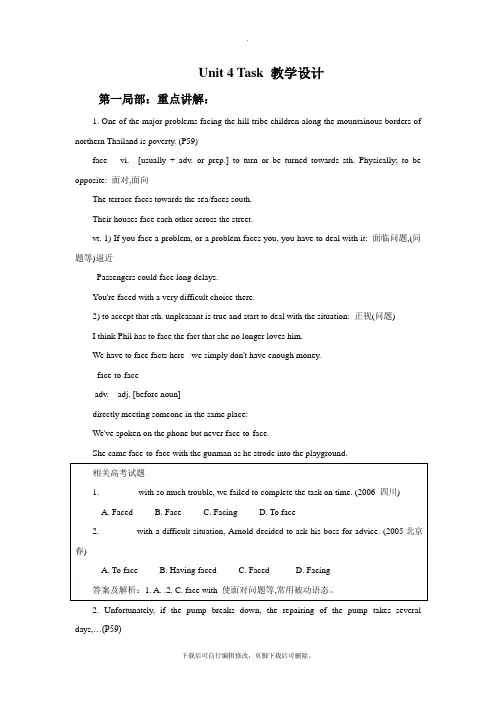
Unit 4 Task 教学设计第一局部:重点讲解:1. One of the major problems facing the hill tribe children along the mountainous borders of northern Thailand is poverty. (P59)face vi. [usually + adv. or prep.] to turn or be turned towards sth. Physically; to be opposite: 面对,面向The terrace faces towards the sea/faces south.Their houses face each other across the street.vt. 1) If you face a problem, or a problem faces you, you have to deal with it: 面临问题,(问题等)逼近Passengers could face long delays.You're faced with a very difficult choice there.2) to accept that sth. unpleasant is true and start to deal with the situation: 正视(问题)I think Phil has to face the fact that she no longer loves him.We have to face facts here - we simply don't have enough money.face-to-faceadv. adj. [before noun]directly meeting someone in the same place:We've spoken on the phone but never face-to-face.She came face-to-face with the gunman as he strode into the playground.2. Unfortunately, if the pump breaks down, the repairing of the pump takes several days,…(P59)break down1) If a machine or vehicle breaks down, it stops working: 机器出故障,汽车抛锚Our car broke down and we had to push it off the road.2)If a system, relationship or discussion breaks down, it fails because there is a problem or disagreement. 方案等失败3)to be unable to control your feelings and to start to cry: 精神崩溃When we gave her the bad news, she broke down and cried.3. Health care is limited as there are no doctors or nurses in the villages ad again no one has the means to pay for them. (P59)means[c] a method or way of doing sth.: 方法We need to find some other means of transportation.She tried to explain by means of sign language.There is no means of tracing the debt at all.第二局部:练习1. Had you listened to the doctor, you _____ all right now.A. areB. wereC. would beD. would have been2. _____ any change about the date, please tell me immediately.A. Will there beB. Should there beC. There will beD. There should be3. _____ today, he would get there by Friday.A. Would he leaveB. Was he leavingC. Were he to leaveD. If he leave4. Should it rain, the crops _____ .A. would be savedB. would have been savedC. will be savedD. had been saved5. You _____ come earlier. The bus left a moment ago.A. wouldB. should haveC. mayD. have6. What should we do if it _____ tomorrow ?A. should snowB. would snowC. snowD. will snow7. You _____ such a serious mistake if you had followed his advice.A. may not makeB. might not makeC. shouldn’t have madeD. might not have made8. If it were not for the fact that you _____ ill, I would ask you to do this right now.A. wereB. had beenC. areD. should be9. —Father, you promised!—Well, _____. But it was you who didn’t keep your word first.A. so was IB. so did IC. so I wasD. so I did10. If you do fall out of the boat, your lifejacket will help you to _____ until we can fish you out.A. stay upB. come upC. make upD. stand up11. To enjoy the scenery, I would rather spend long hours on the train _____ travel by air.A. asB. toC. thanD. while12. I _____ a novel written by Ernest Hemingway last night, and another night I’ll finish it.A. readB. have readC. had readD. was reading13. —Now, where is my MP3?—_________! We’ll be late for the picnic.A. Take your timeB. Don’t worryC. Take it easyD. Come on14. I’d appreciate _______if you would like to teach me how to use the computer.A. thatB. thatC. thisD. you15.—who are you going to have_______ this letter for you?---my secretary.A.typeB. typedC. been typedD. been typing。
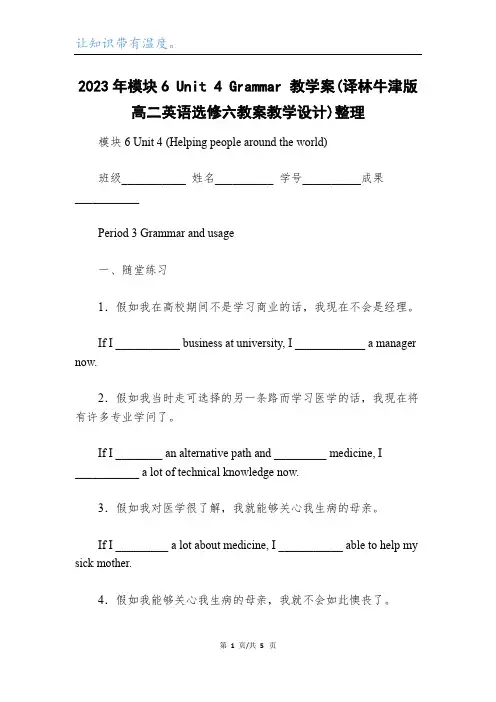
2023年模块6 Unit 4 Grammar 教学案(译林牛津版高二英语选修六教案教学设计)整理模块6 Unit 4 (Helping people around the world)班级___________ 姓名__________ 学号__________成果___________Period 3 Grammar and usage一、随堂练习1.假如我在高校期间不是学习商业的话,我现在不会是经理。
If I ___________ business at university, I ____________ a manager now.2.假如我当时走可选择的另一条路而学习医学的话,我现在将有许多专业学问了。
If I ________ an alternative path and _________ medicine, I___________ a lot of technical knowledge now.3.假如我对医学很了解,我就能够关心我生病的母亲。
If I _________ a lot about medicine, I ___________ able to help my sick mother.4.假如我能够关心我生病的母亲,我就不会如此懊丧了。
If I _________ my sick mother, I ____________ so frustrated.二、虚拟语气专项训练1. If my lawyer _____ here last Saturday, he _____ me from going.A. had been, would have preventedB. had been, would preventC. were, would preventD. were, would have prevented2. If I had worn my coat, I _____ a cold now.A. wouldn’t catchB. wouldn’t have caughtC. won’t catchD. won’t have caught3. -If he _____, he _____ that food. -Luckily he was rushed to hospital immediately.A. was warned, wouldn’t takeB. had been warned, wouldn’t have takenC. should be warned, wouldn’t takeD. could have been warned, wouldn’t have taken4. He _____ you more help, even though he was very busy.A. might have givenB. might giveC. should giveD. may give5. What would have happened, _____ as far as the river bank?A. if Bob walkedB. had Bob walkedC. were Bob to walkD. shouldBob walk6. If it ____ rain this evening, I wouldn’t go to see this American film.A. wouldB. shouldC. mightD. was to7. -My cat’s really fat. -You _____ have given her so much food.A. wouldn’tB. can’tC. shouldn’tD. mustn’t8. _____ the heavy rain, we would enjoy playing football until 6 o’clock.A. WithoutB. In spite ofC. Regardless ofD. Due to9. I told your friend how to get to the hotel, but perhaps I _____ have driven her there.A. canB. mustC. shouldD. would10. I supported him in time, otherwise he _____ off the bike.A. might fallB. would fallC. should have fallD. would have fallen三、词汇练习(第50~57页生词)1. The accident r______ to at the meeting cost fifteen lives.2. Who is the Chinese a________ to the UN at present?3. If not o_______ on at once, the boy will die within 24 hours.4. As we all know, primary education t_______ every child’s future.5. The UN peacekeeping operations aim to end any c_______ in the world.6. I feel h______ to have the opportunity to take a photo with Liu Xiang.7. He broke into the house with the p_______ of stealing money.8. May 1st is L_______ Day.9. My job is not paid but v_________.10. We need to increase the people’s a________ of the importance of environmental protection.11. His accomplishments are w______ of the world’s admiration.12. His attention was d_______ by the beautiful scenery out of the window.13. Time is u______! We should hurry up!14. A______ from flowers and applauses, he expected the world’s admiration.15. The project runs very well under the u_______ of the government.16. He is so young that he l_____ experience.17. The church mouse has to struggle in p______.18. I’m here to see you on b______ of all the staff.19. He spent his childhood in r______ mountains, far away from city life.20. The UN aims to ensure that human rights are a______ to every human in the world.文档内容到此结束,欢迎大家下载、修改、丰富并分享给更多有需要的人。
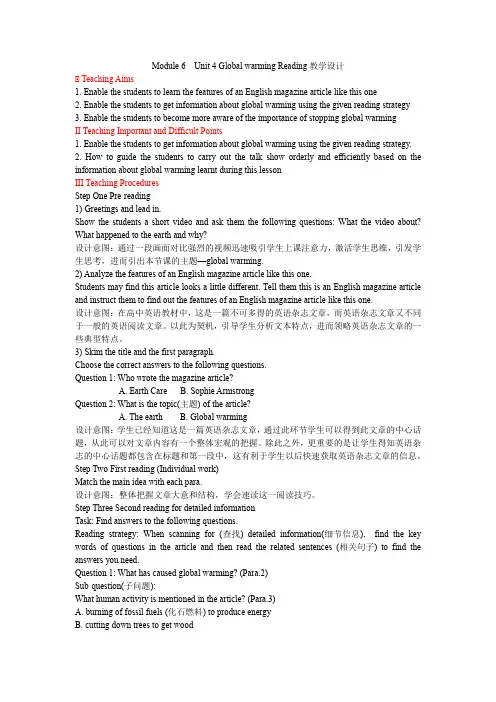
Module 6 Unit 4 Global warming Reading教学设计Ⅰ Teaching Aims1. Enable the students to learn the features of an English magazine article like this one2. Enable the students to get information about global warming using the given reading strategy3. Enable the students to become more aware of the importance of stopping global warmingII Teaching Important and Difficult Points1. Enable the students to get information about global warming using the given reading strategy.2. How to guide the students to carry out the talk show orderly and efficiently based on the information about global warming learnt during this lessonIII Teaching ProceduresStep One Pre-reading1) Greetings and lead in.Show the students a short video and ask them the following questions: What the video about? What happened to the earth and why?设计意图:通过一段画面对比强烈的视频迅速吸引学生上课注意力,激活学生思维,引发学生思考,进而引出本节课的主题—global warming.2) Analyze the features of an English magazine article like this one.Students may find this article looks a little different. Tell them this is an English magazine article and instruct them to find out the features of an English magazine article like this one.设计意图:在高中英语教材中,这是一篇不可多得的英语杂志文章,而英语杂志文章又不同于一般的英语阅读文章。
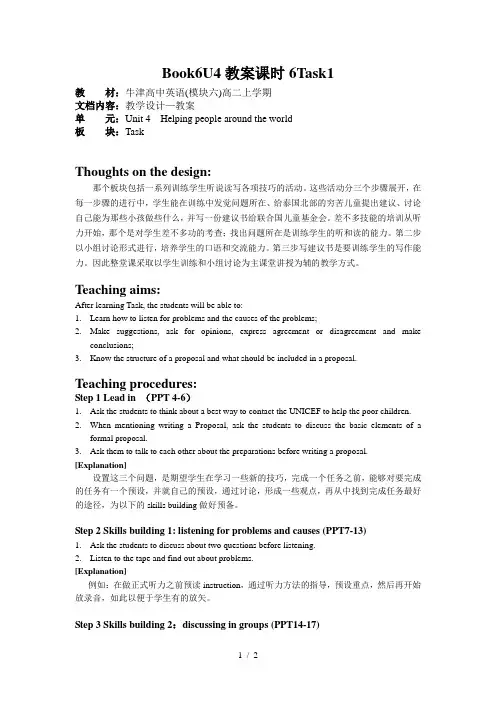
Book6U4教案课时6Task1教材:牛津高中英语(模块六)高二上学期文档内容:教学设计—教案单元:Unit 4 Helping people around the world板块:TaskThoughts on the design:那个板块包括一系列训练学生听说读写各项技巧的活动。
这些活动分三个步骤展开,在每一步骤的进行中,学生能在训练中发觉问题所在、给泰国北部的穷苦儿童提出建议、讨论自己能为那些小孩做些什么,并写一份建议书给联合国儿童基金会。
差不多技能的培训从听力开始,那个是对学生差不多功的考查;找出问题所在是训练学生的听和读的能力。
第二步以小组讨论形式进行,培养学生的口语和交流能力。
第三步写建议书是要训练学生的写作能力。
因此整堂课采取以学生训练和小组讨论为主课堂讲授为辅的教学方式。
Teaching aims:After learning Task, the students will be able to:1.Learn how to listen for problems and the causes of the problems;2.Make suggestions, ask for opinions, express agreement or disagreement and makeconclusions;3.Know the structure of a proposal and what should be included in a proposal. Teaching procedures:Step 1 Lead in (PPT 4-6)1.Ask the students to think about a best way to contact the UNICEF to help the poor children.2.When mentioning writing a Proposal, ask the students to discuss the basic elements of aformal proposal.3.Ask them to talk to each other about the preparations before writing a proposal. [Explanation]设置这三个问题,是期望学生在学习一些新的技巧,完成一个任务之前,能够对要完成的任务有一个预设,并就自己的预设,通过讨论,形成一些观点,再从中找到完成任务最好的途径,为以下的skills building做好预备。
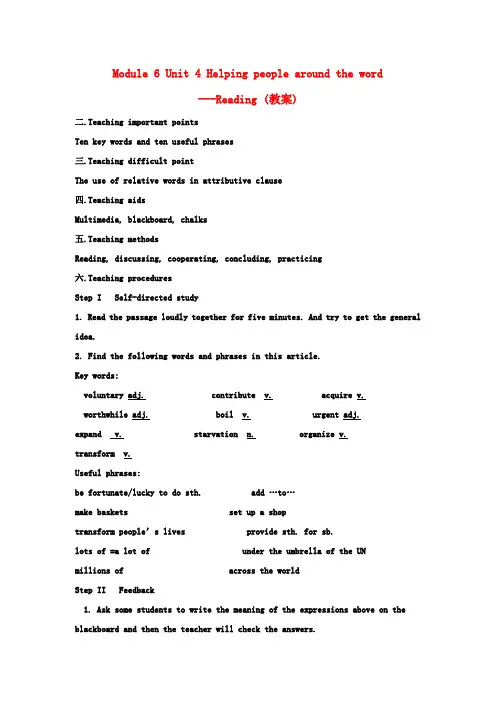
Module 6 Unit 4 Helping people around the word---Reading (教案)二.Teaching important pointsTen key words and ten useful phrases三.Teaching difficult pointThe use of relative words in attributive clause四.Teaching aidsMultimedia, blackboard, chalks五.Teaching methodsReading, discussing, cooperating, concluding, practicing六.Teaching proceduresStep I Self-directed study1. Read the passage loudly together for five minutes. And try to get the general idea.2. Find the following words and phrases in this article.Key words:voluntary adj. contribute v. acquire v.worthwhile adj. boil v. urgent adj.expand v. starvation n. organize v.transform v.Useful phrases:be fortunate/lucky to do sth. add …to…make baskets set up a shoptransform people’s lives provide sth. for sb.lots of =a lot of under the umbrella of the UNmillions of across the worldStep II Feedback1. Ask some students to write the meaning of the expressions above on the blackboard and then the teacher will check the answers.2. Give the students ten minutes to remember these expressions and then check. Every group should have a representative to show in public.Step III Cooperative studyStudents are required to finish the two sentences with proper words, and then discuss the use of relative words used in attributive clause.1. Recently, I was fortunate enough to travel to South Africa,where I met some women who/that have organized themselves into a group.2. There are lots of worthwhile programmes like this under the umbrella of the UN that/which have helped millions of people across the world.Step IV Explaining specificallyIn this part, the teacher will point out some mistakes the students have made above and then give some important points.1. contribute v. → contribution n.contribute tomake a contribution toworthwhile adj. be worthwhile to do / doing sth.2. add to add…to… add upadd up to add that3. transform people’s lives provide sth. fo r sb.lots of =a lot of under the umbrella of the UN4.The use of relative pronouns and adverbials in attributive clauseEg. ① We all know this movie that/which is interesting .② The girl whose hair is curly may be Herry Potter’s friend.③ I do n’t know the reason why he dislikes his mother.Step V Consolidation and practiceAsk some students to conclude what we learned this class and do some exercises to strengthen the contents.1.单选题。

Module 6 Unit 4 Global warming Reading教学设计Ⅰ Teaching Aims1. Enable the students to learn the features of an English magazine article like this one2. Enable the students to get information about global warming using the given reading strategy3. Enable the students to become more aware of the importance of stopping global warmingII Teaching Important and Difficult Points1. Enable the students to get information about global warming using the given reading strategy.2. How to guide the students to carry out the talk show orderly and efficiently based on the information about global warming learnt during this lessonIII Teaching ProceduresStep One Pre-reading1) Greetings and lead in.Show the students a short video and ask them the following questions: What the video about? What happened to the earth and why?设计意图:通过一段画面对比强烈的视频迅速吸引学生上课注意力,激活学生思维,引发学生思考,进而引出本节课的主题—global warming.2) Analyze the features of an English magazine article like this one.Students may find this article looks a little different. Tell them this is an English magazine article and instruct them to find out the features of an English magazine article like this one.设计意图:在高中英语教材中,这是一篇不可多得的英语杂志文章,而英语杂志文章又不同于一般的英语阅读文章。
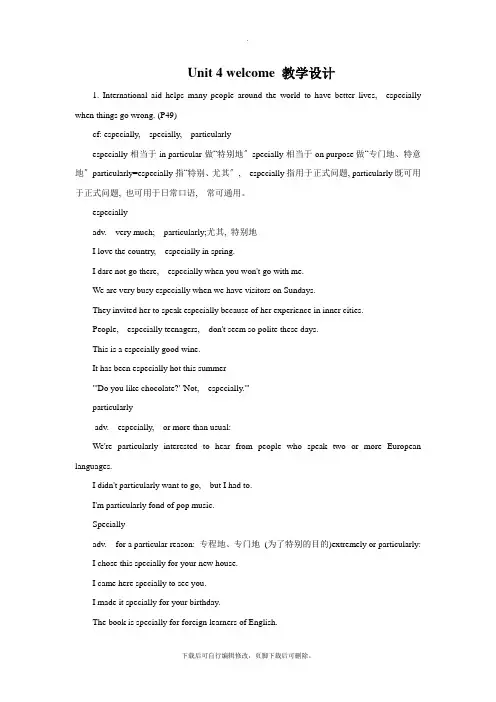
Unit 4 welcome 教学设计1. International aid helps many people around the world to have better lives, especially when things go wrong. (P49)cf: especially, specially, particularlyespecially相当于in particular做“特别地〞specially相当于on purpose 做“专门地、特意地〞particularly=especially指“特别、尤其〞, especially指用于正式问题, particularly既可用于正式问题, 也可用于日常口语, 常可通用。
especiallyadv. very much; particularly;尤其, 特别地I love the country, especially in spring.I dare not go there, especially when you won't go with me.We are very busy especially when we have visitors on Sundays.They invited her to speak especially because of her experience in inner cities.People, especially teenagers, don't seem so polite these days.This is a especially good wine.It has been especially hot this summer"'Do you like chocolate?' 'Not, especially.'"particularlyadv. especially, or more than usual:We're particularly interested to hear from people who speak two or more European languages.I didn't particularly want to go, but I had to.I'm particularly fond of pop music.Speciallyadv. for a particular reason: 专程地、专门地(为了特别的目的)extremely or particularly:I chose this specially for your new house.I came here specially to see you.I made it specially for your birthday.The book is specially for foreign learners of English.go wronggo link-v. [L only + adj.] going, went, goneto become:成为, 变得The idea of going grey doesn't bother me, but I'd hate to go bald.Her father's going senile/blind/deaf.If anything goes wrong, you can call our emergency hotline free of charge.After 12 years of Republican presidents, the US went Democratic in 1992.2. Let’s look at these pictures and discuss the situations with a partner.(P49)situationn. [C] 1) the set of things that are happening and the conditions that exist at a particular time and place: 形势, 状况the economic/political situationHer news put me in a difficult situation."Would you get involved in a fight?" "It would depend on the situation."I'll worry about it if/when/as the situation arises (= if/when/as it happens).2)FORMAL the position of sth., especially a town, building, etc.: 地理位置The house's situation in the river valley is perfect.situate[vt. usually + adv. or prep.] to put in a particular position:使位于, 使坐落于They plan to situate the bus stop at the corner of the road.To understand this issue, it must first be situated in its context.situatedadj. [after verb] in a particular position: 坐落在……的;处于…….的The school is situated near to the station.[+ to infinitive] With this new product, we are well situated to beat (= we have a good chance of beating) our competitors.How are you situated for time (= How much time do you have)?3. When there is a shortage of food, there is a famine.(P49)shortagen. [C] when there is not enough of sth.: 缺少, 短缺There's a shortage of food and shelter in the refugee camps.The long hot summer has led to serious water shortages.short adj. lacking: 缺少的to be short of space/timeWe’re a bit short of coffee . I must get some more.The bill comes to £85, but we’re £15 short.I’m a little short (=I do not have much money)this week- could you lend me ten dollars?。
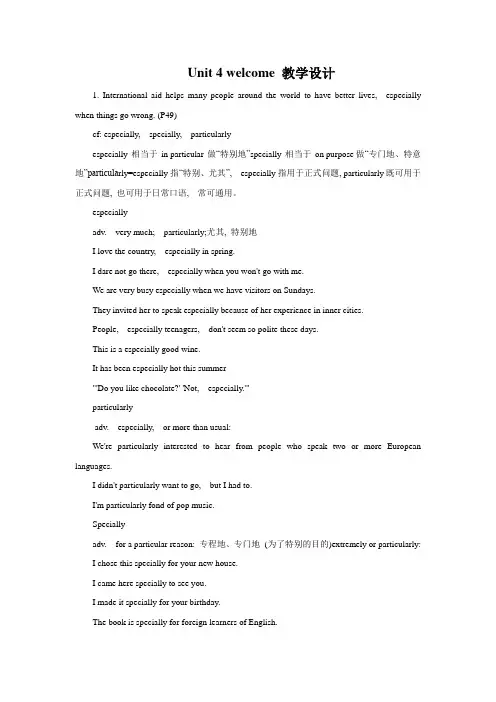
Unit 4 welcome 教学设计1. International aid helps many people around the world to have better lives, especially when things go wrong. (P49)cf: especially, specially, particularlyespecially相当于in particular做“特别地”specially相当于on purpose 做“专门地、特意地”particula rly=especially指“特别、尤其”, especially指用于正式问题, particularly既可用于正式问题, 也可用于日常口语, 常可通用。
especiallyadv. very much; particularly;尤其, 特别地I love the country, especially in spring.I dare not go there, especially when you won't go with me.We are very busy especially when we have visitors on Sundays.They invited her to speak especially because of her experience in inner cities.People, especially teenagers, don't seem so polite these days.This is a especially good wine.It has been especially hot this summer"'Do you like chocolate?' 'Not, especially.'"particularlyadv. especially, or more than usual:We're particularly interested to hear from people who speak two or more European languages.I didn't particularly want to go, but I had to.I'm particularly fond of pop music.Speciallyadv. for a particular reason: 专程地、专门地(为了特别的目的)extremely or particularly:I chose this specially for your new house.I came here specially to see you.I made it specially for your birthday.The book is specially for foreign learners of English.go wronggo link-v. [L only + adj.] going, went, goneto become:成为, 变得The idea of going grey doesn't bother me, but I'd hate to go bald.Her father's going senile/blind/deaf.If anything goes wrong, you can call our emergency hotline free of charge.After 12 years of Republican presidents, the US went Democratic in 1992.2. Let’s look at these pictures and discuss the situations with a partner.(P49)situationn. [C] 1) the set of things that are happening and the conditions that exist at a particular time and place: 形势, 状况the economic/political situationHer news put me in a difficult situation."Would you get involved in a fight?" "It would depend on the situation."。
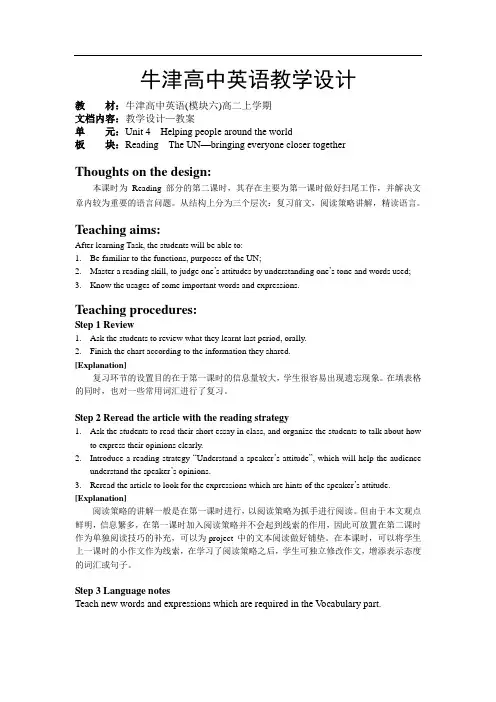
牛津高中英语教学设计教材:牛津高中英语(模块六)高二上学期文档内容:教学设计—教案单元:Unit 4 Helping people around the world板块:Reading The UN—bringing everyone closer togetherThoughts on the design:本课时为Reading 部分的第二课时,其存在主要为第一课时做好扫尾工作,并解决文章内较为重要的语言问题。
从结构上分为三个层次:复习前文,阅读策略讲解,精读语言。
Teaching aims:After learning Task, the students will be able to:1.Be familiar to the functions, purposes of the UN;2.Master a reading skill, to judge one’s attitudes by understanding one’s tone and words used;3.Know the usages of some important words and expressions.Teaching procedures:Step 1 Review1.Ask the students to review what they learnt last period, orally.2.Finish the chart according to the information they shared.[Explanation]复习环节的设置目的在于第一课时的信息量较大,学生很容易出现遗忘现象。
在填表格的同时,也对一些常用词汇进行了复习。
Step 2 Reread the article with the reading strategy1.Ask the students to read their short essay in class, and organize the students to talk about howto express their opinions clearly.2.Introduce a reading strategy “Understand a speaker’s attitude”, which will help the audienceunderstand the speaker’s opinions.3.Reread the article to look for the expressions which are hints of the speaker’s attitude. [Explanation]阅读策略的讲解一般是在第一课时进行,以阅读策略为抓手进行阅读。
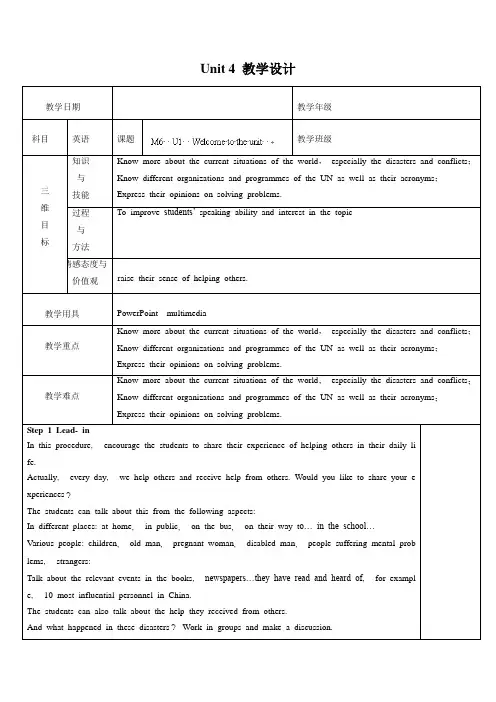
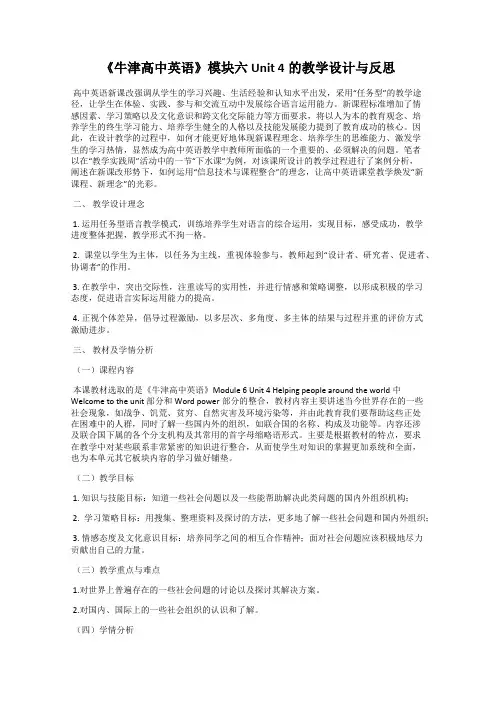
《牛津高中英语》模块六Unit 4的教学设计与反思高中英语新课改强调从学生的学习兴趣、生活经验和认知水平出发,采用“任务型”的教学途径,让学生在体验、实践、参与和交流互动中发展综合语言运用能力。
新课程标准增加了情感因素、学习策略以及文化意识和跨文化交际能力等方面要求,将以人为本的教育观念、培养学生的终生学习能力、培养学生健全的人格以及技能发展能力提到了教育成功的核心。
因此,在设计教学的过程中,如何才能更好地体现新课程理念、培养学生的思维能力、激发学生的学习热情,显然成为高中英语教学中教师所面临的一个重要的、必须解决的问题。
笔者以在“教学实践周”活动中的一节“下水课”为例,对该课所设计的教学过程进行了案例分析,阐述在新课改形势下,如何运用“信息技术与课程整合”的理念,让高中英语课堂教学焕发“新课程、新理念”的光彩。
二、教学设计理念1. 运用任务型语言教学模式,训练培养学生对语言的综合运用,实现目标,感受成功,教学进度整体把握,教学形式不拘一格。
2. 课堂以学生为主体,以任务为主线,重视体验参与,教师起到“设计者、研究者、促进者、协调者”的作用。
3. 在教学中,突出交际性,注重读写的实用性,并进行情感和策略调整,以形成积极的学习态度,促进语言实际运用能力的提高。
4. 正视个体差异,倡导过程激励,以多层次、多角度、多主体的结果与过程并重的评价方式激励进步。
三、教材及学情分析(一)课程内容本课教材选取的是《牛津高中英语》Module 6 Unit 4 Helping people around the world中Welcome to the unit 部分和Word power部分的整合,教材内容主要讲述当今世界存在的一些社会现象,如战争、饥荒、贫穷、自然灾害及环境污染等,并由此教育我们要帮助这些正处在困难中的人群,同时了解一些国内外的组织,如联合国的名称、构成及功能等。
内容还涉及联合国下属的各个分支机构及其常用的首字母缩略语形式。
模块6 Unit 4 Rreading 教学案(译林牛津版高二英语选修六教案教学设计)模块六 Unit 4 (Helping people around the world)Period 1 ReadingTeaching aims:1. To encourage students to share their experience of helping others in their dailylife and let them know the importance of helping others;2. To teach students some general information about the work and responsibilityof a UN Goodwill Ambassador;3. To help students practice and reinforce their reading skills;4. To help students master the language points in the reading.Teaching difficulties:1. How to use “as” in different kinds of clauses.2. How to interchange attributive clauses and verb-ing or verb-ed phrases.3. How to combine two independent sentences using attributive clauses.Teaching procedures:Step 1 Lead-in1. Start the class with the following questions:Have you ever thought about the future?What do you want to be in the future?What do you think you should do to make your dream come true in the future?Which do you think will help you fulfill your dream?Have you ever thought about doing something for those children to help themrealize their dreams? If you have, what would you do?2. Have students discuss and report their answers to the class. Help studentsunderstand that not everyone in the world has the same opportunities. It wouldbe very hard for some people in poor areas to realize even a simple dream likehaving a warm bed to sleep in at night. Something should be done for those whoare suffering a lot.3. Tell students that they are going to read a passage abouta helpful woman whohas devoted lots of her energy and time to making the life of poor people better.Ask students what they can find by reading the title, and ask them to predictwhat may be covered in the passage that they are going to read. Say:Today, we are going to read a passage entitled “The UN-bringing everyone closertogether”. What do you think of when you see the title? What do you think willbe mentioned in the passage?Step 2 Reading-comprehension1. Ask students to go through the passage as quickly as possible and try to find theanswers to the three questions in Part A. Remind students only to focus on andanswer these questions.2. Ask students to read the passage again and complete PartsC1 and C2 individually.After students finish the exercises, check the answers with the class.3. design a table to check the students’ reading comprehension about the UN.The United NationsWhen it was set up After the Second World War in October 1945Countries in the UN Originally 51 countriesRecently 191 countriesProblems it deals with Helps end some of the world’s most horrible conflicts, assists the victims of wars and disasters; protect human rights; improves international laws; helps with other problems such as lack of education, lack of food, poverty, disasters and diseaseIts four main purposes To keep international peaceTo develop friendly relationships among nationsTo cooperate in solving international problems and in promoting respect for human rightsTo be a centre for organizing the actions or work of different nationsGoals it promises to achieve by 2015 Eight goals, one of which is to ensure that fresh drinking water is available to everyone and another is that all children complete primary education4. Talk to students about Tang Ning. Ask students what they know about thisUN Goodwill Ambassador and businesswoman from the passage. You may askthe following questions:What occupation does she take up in the UN?How much money does she earn by doing this Job?What Project or projects has she been involved in?How does she help those people that need help?How does she feel about taking this occupation?What do you think of Tang Ning?Step 3 Language points1. refer toWhat I have to say refers to all of you.When I said that some people were stupid I was not referring to you.Please refer to the last page of the book for answers.It is a collection of documents with reference to the First World War.2. be made up ofA team made up of three doctors and ten nurses was sent to the disaster area.The oldest kind of computer was a huge machine made up of thousands of parts,covering nearly 100 square meters.3. operateAll the Disney parks are operated by the same company.This machine operates day and night.The doctors decide to operate on her immediately.Operation n.I can use a word processor but I don’t understand its operation.He is the officer in charge of operation.4. honoredHe was honored with a title of “ Model Worker”.They removed their hats to honor the flag.It’s a great honor to be invited.May I have the honor of this dance?While in London, we paid a visit to the hospital founded in honor of the nurseFlorence Nightingale.5. touchVisitors are not allowed to touch the exhibits.I was really touched beyond words.We’ll keep in touch with each other wherever we go.I hope we don’t lose touch again.6. apart fromThe house stands apart from the village.I can’t get these two things apart.He tore the cooked chicken apart and began to eat it.7. lackThey are so rich that they lack for nothing.He was acquitted for lack of evidence.There was a severe shortage of petroleum during the war.8. ensureThe book ensured his success.Please ensure that all the lights are turned off at night.These pills should ensure you a good night’s sleep.Customs are asked to ensure that they have been given the right change beforeleaving the shop.9. rather thanI’d prefer to go in summer rather than in winter.It ought to be me rather than you that sign the letter.I decided to write rather than (to ) telephone.I would stay at home rather than go shopping.He would rather beg in the streets than get money in such a dishonest way.10. on behalf ofOn behalf of my colleagues and myself I thank you.Ken is not present, so I shall accept the prize on his behalf.The legal guardian must act on behalf of the child.On behalf of all the staff, I would like to wish you a happy retirement.Step4 Practice & Reading strategy1. Ask students to complete Part D and Part E individually. Part D aims to checkwhether students can understand the meanings of words from the context of thepassage and to show them how to explain the meanings in English. Part E aims tomake students more familiar with the reading passage and some useful words in it.2. Ask students if they have ever read a speech before and encourage them to find outwhat unique language is used in a speech. Remind then that when reading a speech,it is important to pay attentio n to the speaker’s attitude. The positive and negativeadjectives can help then identify the positive negative opinion or attitude of thespeaker.3. Ask students to read the Reading Strategy and find more sentences that express thespeaker’s attitude in the reading passage.Step5 Homework1. Review the text carefully after class.2. Finish off Part A1, A2 in Workbook.3. Finish off the exercise paper for this part.Exercises for students:一、非谓语动词复习练习1. ______ nuclear radiation, even for a short time, may produce variants (变异) of genesin human bodies.A. SufferedB. SufferingC. Being sufferedD. Having suffered2. ______ to be practical, the new teaching method is being accepted by more and moreeducational workers.A. Having provedB. ProvingC. ProvedD. Having been proved3. The car burns much fuel, but ______ all things into consideration, it is still a good car.A. takenB. having takenC. takingD. to take4. -The price is fine with me. How would you like it ______? -In cash, please.A. to payB. payC. paidD. being paid5. When he came back, he found the bag he had ______ over the seat was gone.A. left to handB. left hangingC. left hungD. to leave hanging6. -Why do you look so disappointed, John?-The outdoor concert ______ for tomorrow will be put off.A. to planB. to be plannedC. planningD. planned7. The news reporter hurried to the airport, only ______ the film star had left.A. to tellB. tellingC. to be toldD. told8. ______ a job as a professor in a well-known university, adoctor's degree is needed.A. Having goB. If you wantC. So as to getD. In order to get9. These examples, once ___ to his article, will make it sound more reasonable andacceptable. A. add B. to add C. adding D. added10. -Where can I get this gift ______? -Over at Window No. 6 and wait ______.A. to be wrapped; to be calledB. wrapping; to callC. wrapped; to callD. wrapped; to be called11. “I hope the operation,” said the father, “______ now will give my son a new life. ”A. being performedB. to be performedC. performingD. performed12. There are ten waiting rooms at the newly-built station, in all 20,000 people.A. seatingB. seatedC. sittingD. to seat13. -How do you deal with the agreement between the company and the customers?-The key _ the problem is to meet the demand _ by the customers.A. to solving; makingB. to solving; madeC. to solve; makingD. to solve; made14. More natural resources should be made use of ______ the ______ need of energy.A. meeting; increasingB. to meet; increasedC. meeting; increasedD. to meet; increasing15. The man we followed suddenly stopped and looked as if ______ whether he wasgoing in the right direction.A. seeingB. having seenC. to have seenD. to see16. Though ______ money,his parents managed to send him to university.A. lackedB. lacking ofC. lackingD. lacked in17. The local health organization is reported ___ twenty-five years ago.A. to be set upB. to set upC. to have been set upD. to have set up18. I appreciated ______the opportunity to study abroad two years ago.A. having been givenB. having beenC. to have been givenD. to have given19. There is no point ___further.A. argueB. to argueC. arguingD. being arguing20. All flights___ because of the snowstorm, we decided to take the train.A. were canceledB. had been canceledC. having canceledD. having been canceled21. He always does nothing but___.A. complainingB. complainsC. complainD. to complain22. John painted her sitting in a chair with her hands ___.A. foldingB. to have foldedC. to foldD. foldedRecording after teaching:向你推荐的相关文章相关文章列表微信扫码分享热搜文章•1•2•3 •4 •5 •6 •7 •8 •9 •10 ~。
牛津高中英语Module 6 Unit 4 Reading The UN----bringing everyonecloser together的教学设计Learning aims:1.To gain some knowledge about the United Nations2.To reinforce reading skills3.To improve overall ability in participating in the activitiesDifficult and important points:1.How to improve abilities in reading2.Reading strategy on how to understand a speaker’s attitude in a speechType of Lesson: A reading comprehensive lessonTeaching Aids: MultimediaLearning approach:Read, write and applyTeaching procedures:Step One :Lead-inHow much do you know about the UN?Step Two: Reading Strategyenthusiastic mannerFavorablepositive adjectives/ aspectsunderstanding aspeaker’s attitudeUnfavorable negative adjectivesJudge what attitude the following sentences express1.I am very happy to have been chosen to…2.I feel honoured to have been able to …3.The UN assists the victims of …, the UN helps protect…4.…the problems such as lack of education, starvation , disasters,AIDS and other diseases.5. So you see ,with the work of the UN the world has been brought closer together. Favorable:Unfavorable:Step Three: Fast Reading1.Who is Tang Ning?2.How many countries belong to the UN?3.Which countries has Tang Ning visited?Step Four: Careful ReadingTask1:After reading the first and the second paragraph of this speech, please answer thefollowing questions to test how much common sense you have known about the UN.1. What is the UN?A. The UN is an organization which was controlled by a super country.B. The UN is an organization which consists of a few countries in the world.C. The UN is an international group made up of nearly all countries that want to promote peace.D. The UN is an organization which is in charge of national affairs.2. The UN was set up in 1945 by 57countries. (true / false)3. The UN consists of all the countries in the world today. (true / false)4. Why does the UN deal with so many problems?The purposes of the UN: 1.2.3.4.Task 2: Having known the common sense of the UN, please read the third and sixth paragraph and find out what problems the UN has to deal with.1. What problems does the UN deal with?A. The UN helps end some of the world’s most horrible conflicts.B. The UN assists the victims of wars and disasters.C. The UN protects human rights and improve international laws.D. The UN helps with other problems such as lack of education, starvation, disasters and diseases.2. In order to help end some of the world’s most horrible conf licts, The UN has its own army. (true / false)Task3.Read the fourth and the fifth paragraph, and answer the following questions.1. How do her visits help those countries she visited?2.What are the necessary qualifications to a Goodwill Ambassador?3.Read paragraph 5 again, and guess the name of the organization referred to in the paragraph.A. United Nations Development Fund for Women.(UNIFEM)B. United Nations International Children’s Emergency Fund (UNICEF)C. United Nations Environment Programme (UNEP)D. World Health Organization(WHO)4.How much else do you know of the UNIFEM? And What else organizations of the UN do you know about? (Your last homework) Could you share your information with us?Task4:R ead the last paragraph, and let’s see the go als of the UN.1.What does the UN promise to the world by 2015?A. To meet the eight development goals.B. To ensure all children complete primary education.C. To ensure that fresh drinking water is available to everyone.D. To solve all the present serious problems.Step Five:ConsolidationTime October, 1945Membercountries( originally) 51; (recently) (1)_Tasks 1.to help end (2)________;2.to assist victims of wars and disasters;3.to protect human (3)___________;4.to improve international (4)_________ ;5.to help with problems of starvation ,disaster s…Purposes 1.to keep international (5)______ ;2.to develop friendly (6)___________ among nations;3.to cooperate in solving international conflicts and in promotingrespect for human (7)________________;4.to be a (8)_______ for organizing the actions of countries.(9) (2015) There is 8 in all, including:clean water available to everyone; primary(10)_______ of all children.Step Six: DiscussionAs common people, what can we do to help those in need?Step Seven:Writing昨天你们全班同学进行了关于我们普通人是否应该加入一个慈善组织的讨论。
模块6 Unit 4 Project 教学案(译林牛津版高二英语选修六教案教学设计)整理模块六Unit 4 (Helping people around the world)Period 5 ProjectTeaching aims:1. To help students get the detailed information about the text.2. To make students master the language points in the text.Teaching difficulties:1. How to make the students understand the passage better.2. How to help the students finish all the exercises on the paper.3. How to help the students grasp the usage of the new words in the text.Teaching procedures:Step 1 Lead-inAsk students the following questions and discuss them briefly.1. Does anyone in the world need any help from others?2. What will you do if you are asked to offer help ?3. What does MSF stand for? And what’s its purpose?4. What do you think the members of MSF are?5. Where do you think the nurse works most of the time?6. What do you think is the most difficult thing for her to do?7. What are the reasons why people there live such poor and terrible lives?Step 2 Reading-comprehensionAsk the students to read through the text within ten minutes and complete thefollowing table with one exact word in one blank.Change the world-my commitment1._______ Everything is in chaos;The whole island is flooded;People have 2.________ to escape the floods.The work of MSF Sets up feeding centers;Checks the health of babies;Conducts a vaccination campaign;Sets up a 3._______ medical center on the north of the town;4.________ the dead bodies as quickly as possible. dangers The5.________ of diseases;Possible 6.________ from the people who fight for food;7._________ caused by destroyed fields and harvest. Thinking Being 8.________ over the local people’s lives Feeling lucky and proud to be able to help others everywhere;9.________ all the things she has had today;Hoping to make a difference to people’s lives 10._________. Step3 Further reading1. Listening for further information2. Questions:Para 11) How did she help?Set up feeding centers to ensure that people got food and we checked the health of babiesto make sure they were putting on weight. We had a vaccination campaign to stop childrendying from measles.2) What dangers did she face?Fighting in villages far from the city; looking out for bullets and running from one place toanother became way of life; water borne diseases such as malaria and typhoid; mud andwater everywhere, making it difficult to travel from place to place.Para 21) Where was the A temporary clinic?In a vacant health center in the north side of the town.2) What problems can it solve?People who have regular medication cannot get hold of it in a disaster such as this.Minor injuries also need to be taken care of , especially as it is so wet.3) What are other problems they must face?In the rest of the city, shelter and access to food and clean water are big problems. Thefields and harvest have been destroyed and so malnutrition will be a problem in thefuture. People have started to worry about that they will not get enough food.Para 31. How do they communicate?By speaking English or French, or using acting skills.2. What are horrible things for her?It is quite horrible to imagine losing everything, including some of your family.That was a really horrible job to bury the dead bodies as quickly as possible to stopdisease spreading.Para 41. What is the main idea of this paragraph?About the MSF nurse’s feelings of working there.2. Does she enjoy the experience of working there? Why?Yes. This experience makes her appreciate all the things she has and gives her thechance to see things from another side.Step 4. Language focusArrived here to find everything was in chaos.(1)不定式to find 作结果状语,在英语中常见。
Unit 4 Reading 教学设计1Step 1 Warming up:(A)What do you know about the UN?Where is the headquarter of the UN ?What is the emblem of the UN?What is the flag of the UN?Who are the present and former Secretary-General of the UN ?When is United Nations day ?What is the purpose of the UN ?What do you think the UN do to help the world ?(B) about goodwill ambassador?Who are they ?What are they famous for ?What do they do to help the people in need?•Roger Federer accepts his appointment as a UNICEF Goodwill Ambassador at UNICEF House on 3 April 2006.•Actor Khaled Abol Naga is appointed UNICEF Egypt Ambassador•CAIRO, 10 April 2007 - UNICEF Egypt has announced the appointment of leading actor Khaled Abol Naga as an Ambassador.•CIUDAD VIEJA, Uruguay, 31 March 2005 – Football superstar Diego Forlán has long been a hero to many Uruguayan children. In March he was named a UNICEF Goodwill Ambassador, giving his young fans even more reason to cheer.•One of the most exciting pianists of our time, Lang Lang, age 23, is UNICEF’s youngest celebrity recruits, becoming a UNICEF Goodwill Ambassador on 20 May 2004.•Jackie Chan, world-famous actor and martial arts expert, was appointed as Goodwill Ambassador for UNICEF and the Joint United Nations Programme on HIV/AIDS (UNAIDS) during a visit to Cambodia in April 2004.Step 2 Reading comprehensionA. Fast reading1.Who is Tang Ning?2.How many countries belong to the UN?3.Which countries has Tang Ning visited?• 1. Soldiers representing the UN wear green berets.( )• 2.The UN was set up in 1945 by 57 countries.( )• 3.The UN has a charter with four main purposes.( )• 4.Tang Ning gets paid for her work as a UN Goodwill Ambassador.( )• 5.UNIFEM is a group that helps women.( )• 6.The UN has a website. ( )C. Further Reading: analyze the text(1)Listen and find out the answers to the questions in Part A on P50 and divide the text into three parts.Part 1 Brief introduction of the UNPart 2 (P3-4) Working as a Goodwill AmbassadorPart 3 (P5)(2) Reading the text carefully and fill in the table.A. the United StatesB. Goodwill Ambassador for the UNStep 3 Further understandingGoodwill Ambassador for the UNThe United Nations。
《牛津高中英语》模块六Unit 4的教学设计与反思芮元林南京市江宁区教学研究室一、引言高中英语新课改强调从学生的学习兴趣、生活经验和认知水平出发,采用“任务型”的教学途径,让学生在体验、实践、参与和交流互动中发展综合语言运用能力。
新课程标准增加了情感因素、学习策略以及文化意识和跨文化交际能力等方面要求,将以人为本的教育观念、培养学生的终生学习能力、培养学生健全的人格以及技能发展能力提到了教育成功的核心。
因此,在设计教学的过程中,如何才能更好地体现新课程理念、培养学生的思维能力、激发学生的学习热情,显然成为高中英语教学中教师所面临的一个重要的、必须解决的问题。
笔者以在“教学实践周”活动中的一节“下水课”为例,对该课所设计的教学过程进行了案例分析,阐述在新课改形势下,如何运用“信息技术与课程整合”的理念,让高中英语课堂教学焕发“新课程、新理念”的光彩。
二、教学设计理念1. 运用任务型语言教学模式,训练培养学生对语言的综合运用,实现目标,感受成功,教学进度整体把握,教学形式不拘一格。
2. 课堂以学生为主体,以任务为主线,重视体验参与,教师起到“设计者、研究者、促进者、协调者”的作用。
3. 在教学中,突出交际性,注重读写的实用性,并进行情感和策略调整,以形成积极的学习态度,促进语言实际运用能力的提高。
4. 正视个体差异,倡导过程激励,以多层次、多角度、多主体的结果与过程并重的评价方式激励进步。
三、教材及学情分析(一)课程内容本课教材选取的是《牛津高中英语》Module 6 Unit 4 Helping peoplearound the world中Welcome to the unit 部分和Word power部分的整合,教材内容主要讲述当今世界存在的一些社会现象,如战争、饥荒、贫穷、自然灾害及环境污染等,并由此教育我们要帮助这些正处在困难中的人群,同时了解一些国内外的组织,如联合国的名称、构成及功能等。
内容还涉及联合国下属的各个分支机构及其常用的首字母缩略语形式。
主要是根据教材的特点,要求在教学中对某些联系非常紧密的知识进行整合,从而使学生对知识的掌握更加系统和全面,也为本单元其它板块内容的学习做好铺垫。
(二)教学目标1. 知识与技能目标:知道一些社会问题以及一些能帮助解决此类问题的国内外组织机构;2. 学习策略目标:用搜集、整理资料及探讨的方法,更多地了解一些社会问题和国内外组织;3. 情感态度及文化意识目标:培养同学之间的相互合作精神;面对社会问题应该积极地尽力贡献出自己的力量。
(三)教学重点与难点1.对世界上普遍存在的一些社会问题的讨论以及探讨其解决方案。
2.对国内、国际上的一些社会组织的认识和了解。
(四)学情分析1. 该校学生生源状况并不理想,但是所带高二年级的学生经过一年多的高中英语学习,已经具有一定的英语语言基础,能够较好地表达自己对一些事物的观点,也能够就一定话题发表自己独到的看法,学生之间的合作学习能力也有了较大的提高。
2. 教师在上课之前已安排学生通过上网或去图书馆查阅资料,搜索一些关于社会问题和国内外组织的信息,学生对本节课的学习做了一定的准备。
(五)教学方法:整合;讨论;多媒体演示;小组活动;任务型教学(六)教学手段:多媒体设备;网络;黑板和粉笔四、教学设计1.导入(Lead-in)引用网上下载的Flash《爱的奉献》导入,它是由一系列图片及所配的贴切的文字组成的,内容讲述了在中国以及世界的很多贫困地区,甚至在一些大城市都还存在着不少的贫困人群,他们食不果腹,衣不遮体,为了生计到处流浪,他们还期待着能有机会去上学。
总之,他们的生存状况很糟糕。
(学生看得很安静,可能同时也在想:自己应该好好珍惜眼下这么好的学习机会,珍惜这来之不易的美好生活,这也是情感教育的目标,他们看到这些也会自然想到应该伸出援助之手去帮助那些贫困人群)。
在此基础上便抛出以下一系列问题,如:What do you think of the situation of people in the flash?What can we do to help them?Besides ourselves, who can we call on to help those people in trouble?学生们对这些画面感触很深,于是便争相表达出了他们的看法。
因为课前他们已经搜索到不少关于此类社会问题的信息资料,所以能够很踊跃地回答。
其中就有同学说到:I think that our world is not rich enough, that there is still much unfairness, and that the rich should help the poor./ We should value our opportunity of studying and don’t waste anything during our life.2.呈现(Presentation)表明除了刚刚在Flash里边看到的现状,在当今世界还存在着很多其他的问题,然后引导学生看课本P49上的六幅图片。
让同学们根据每幅图的解说,结合我设置的一些问题去理解图片并发表自己的看法。
如:Have you ever seen this situation? /Where have you seen it? / What’s your feeling when seeing this situation?(学生们会说得比较贴切,也能很好地表达自己的看法)接着再抛出一个问题“What organizations do you know of that can help with the situation in the pictures?”同学们最先想到了“Project Hope”,在我的鼓励下也有学生提到了一些别的组织,但有的不会用英文说,我便鼓励他们先用中文讲,然后再给他们翻译,如:扶贫工程——Anti-poverty Project ;国家自然灾害救助管理机构——the NationalAdministrative Organization of Scouring Natural Disaster;联合国儿童基金组织——United States International Children Emergency Fund;国际红十字会——International Committee of the Red Cross;联合国维和部队——United Nations Peace-keeping Forces等等。
3.扩展(Extension)先问学生是否知道更多的国内、国外组织以及他们的具体组成及作用等等。
如:Do you know any other national or international organizations that can help people who are still living in poverty and in trouble?(学生当然首推The United States.回答得很好,鼓励一下。
)于是再问:Do you know how many parts the United States includes?(学生开始各抒己见,毕竟他们在课外或其他课上已经了解到关于联合国的一些知识了。
其中就有学生提到了安理会和秘书长,于是我给出了他们这两个词的英语表达:the Security Council 和the Secretary General,学生进而竟想到了前联合国秘书长安南,我则顺便考查一下他们的时事知识,“Is Annan still the Secretary General of the UN?”“No!”“Then who?”学生们开始议论了。
有学生小声地说到了现任联合国秘书长潘基文(Ban Ki-moon),于是便鼓励了一下他们,同时表扬了他们对时事的关心。
)接下来,给学生一定的时间,要求他们根据Part A 的内容来完成Part B 部分。
之后通过多媒体课件展示给学生以下答案:United Nations—Specialized agencies(1) International Labor Organization(2) Food and Agricultural Organization(3) UN Educational, Scientific and Cultural Organization(4) World Health Organization(5) Universal Postal Union(6) World Bank GroupInternational Monetary Fund—Programmes and funds(7) UN Children’s Fund(8) UN Environmental Programme(9) UN Drugs Control Programme(10) UN Development Programme然后再要求学生:根据Part A和Part B 部分已出现的信息和国际组织的名称来完成Part C部分(Then ask the students to finish part C on page 55 by using the names of organizations in parts A&B; at the same time, they can further their understanding of these organizations.)因为这一部分确实属于只要求学生认知的部分,处理起来也就比较简单一点。
又因为这些组织的名称经常在报纸和一些杂志上出现,根据它们自身的特征,只要求学生知道其简略形式就行了,于是讲到了它们的首字母缩略形式。
如:WTO—World Trade OrganizationUNESCO—United States Educational, Scientific and Cultural OrganizationFAO—Food and Agricultural OrganizationNGOs—Non-Governmental Organization4. 巩固(Consolidation)将学生分成六个小组,要求每个小组选择一个社会问题进行讨论,并要求找出问题的原因、现状、影响以及出现次问题时该向哪个组织求助。
建议每组选出一名学生充当该组织的发言人并告诉我们该如何处理这样的问题。